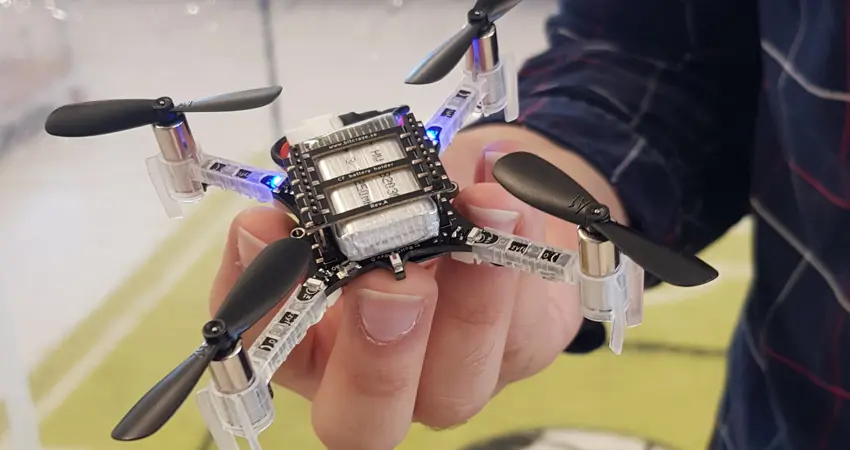24 Sep 2019
EUROP programme gives undergraduates hands-on research experience
3rd year student Aren Karapetyan uses summer break to learn how to control, robustify and program small drones

Aren learnt to control, robustify and program small drones
3rd year student Aren Karapetyan is flying a tiny drone inside a see-through tent. He’s demonstrating flight path planning and control to prospective undergraduates at the Department’s Open Day, but for the past five weeks he has been doing a research project on drones as part of the Engineering Undergraduate Research Opportunities Programme (EUROP) scheme.
Introduced by the Department in 2019, EUROP funds students to work on real research projects alongside academics for up to eight weeks during their summer break. The Department hopes the scheme will support the students in their future careers by contributing to their employability and skillset, as well as translating the theory taught in lectures into the research environment.
“The EUROP scheme offers a fantastic opportunity to undergraduate students to get immersed in research and explore a topic of their interest”
Professor Antonis Papachristodoulou, EUROP supervisor
Aren chose to base his programme around Control Engineering, which is taught to undergraduates from the second year onwards. Aren says, “Control Engineering is a very unique branch of engineering that has applications in almost all other branches. The Control course in Oxford was made so interesting, that I decided to pursue a DPhil in that area.”
He adds, “My goal was to get a taste of what it is to be a research student and most importantly improve myself as a researcher. When the departmental EUROP scheme was advertised it seemed the perfect choice for me, as it was created for students like me and would cover all my expenses”.
Small drones like the 27g quadcopters Aren is researching are highly manoeuvrable, however because of their lightweight nature they are easily blown or knocked off-course. Aren is using the EUROP opportunity to work out how to control, robustify and program an individual drone to accomplish various tasks such as room surveillance and tracking. In his 4th year project, he will amass a tiny fleet of drones with the aim of getting them to work together autonomously.
The scheme has given Aren a valuable insight into real-world research. “I have already learnt a lot in terms of software and control engineering as well as key research skills”, he explains. “Very soon after starting the project I discovered for myself the challenges of research, how open-ended it can be at most times, and how different in principle it is from standardised curriculum learning. But thanks to the resources [made] available by the department and help from my supervisors, I now solve the recurring problems more independently and with more foresight.”
It offers academics the opportunity to define short but concise research projects, and train highly motivated students in their first research steps
Professor Kostas Margellos, who is supervising Aren along with Professor Papachristodoulou on the programme, says “EUROP is of significant mutual benefit to both students and academic supervisors. Students get a first glimpse of what a research project encompasses, and a more hands-on experience on a particular topic. This naturally helps them crystallise their subsequent choices, and is particularly enlightening for the ones willing to follow an academic path. On the other hand, it offers academics the opportunity to define short but concise research projects, and train highly motivated students in their first research steps.”
Aren agrees that the programme has also helped him narrow down ideas about his doctorate and hence his choice of 4th year modules: “Thanks to it, I now have a research proposal in mind and am confident in my skills to successfully finish my undergraduate studies at Oxford”.




